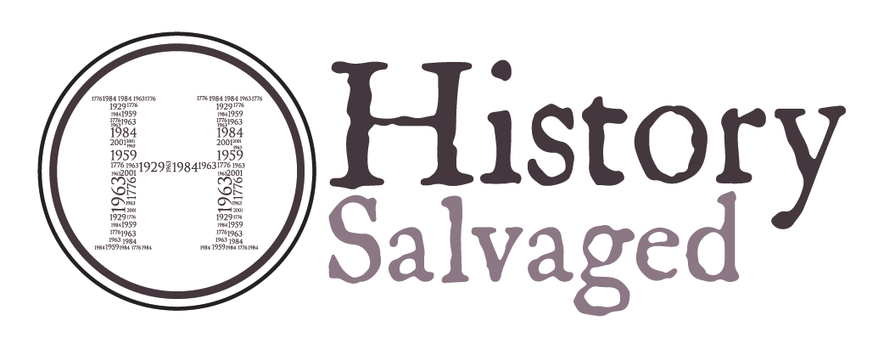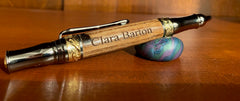-
William "Buffalo Bill" Cody - Handcrafted Fountain Pen
Buffalo Bill
-
$600.00
-
-
Description
- Handcrafted One of a Kind "Buffalo Bill" Fountain Pen
- Featuring Authentic Witness Wood® from the National Historic Site and home of the World Famous American Soldier, Bison Hunter and Showman William "Buffalo Bill" Cody
- Engraved - NONE
- Made in the USA, this pen is handcrafted from Witness Wood® removed from the barn on Bill's 4000 acre Scout's Rest Ranch in North Platte, NB.
- This pen is individually handcrafted by our Master Pen Maker - John Greco -
- The Witness Wood® was hand-cast in black and silver shimmer resin with a matching nib grip.
- Handcrafted Sterling Silver roll stop.
- Fine #6 JoWo Steel Nib, converter and cartridge system.
William Frederick "Buffalo Bill" Cody
William Frederick "Buffalo Bill" Cody was an American soldier, bison hunter, and showman. He was born in Le Claire, Iowa Territory on February 26, 1846, but he lived for several years in his father's hometown in modern-day Mississauga, Ontario, Canada, before the family returned to the Midwest and settled in the Kansas Territory.
A Medal of Honor awardee, Indian Fighter, Trapper, Bullwacker, Stagecoach Driver Hotel Manage and Pony Express Rider, Buffalo Bill is literally the man who coined the name the Wild West.
In December 1872, Cody traveled to Chicago to make his stage debut with his friend Texas Jack Omohundro in The Scouts of the Prairie, one of the original Wild West shows produced by Ned Buntline. The effort was panned by critics – one critic compared Cody's acting to a "diffident schoolboy" – but the handsome performer was a hit with the sold-out crowds.
In 1873, Cody invited "Wild Bill" Hickok to join the group in a new play called Scouts of the Plains. Hickok did not enjoy acting and often hid behind scenery; in one show, he shot at the spotlight when it focused on him. Therefore, he was released from the group after a few months. Cody founded the Buffalo Bill Combination in 1874, in which he performed for part of the year while scouting on the prairies the rest of the year. The troupe toured for ten years. Cody's part typically included a reenactment of an 1876 incident at Warbonnet Creek, where he claimed to have scalped a Cheyenne warrior.
In 1883, in the area of North Platte, Nebraska, Cody founded Buffalo Bill's Wild West, a circus-like attraction that toured annually. (Contrary to the popular misconception, the word show was not a part of the title.) With his show, Cody traveled throughout the United States and Europe and made many contacts. He stayed, for instance, in Garden City, Kansas, in the presidential suite of the former Windsor Hotel. He was befriended by the mayor and state representative, a frontier scout, rancher, and hunter named Charles "Buffalo" Jones. In 1886, Cody and Nate Salsbury, his theatrical manager, entered into a partnership with Evelyn Booth (1860–1901), a big-game hunter and scion of the aristocratic Booth family. It was at this time Buffalo Bill's Cowboy Band was organized. The band was directed by William Sweeney, a cornet player who served as leader of the Cowboy Band from 1883 until 1913. Sweeney handled all of the musical arrangements and wrote a majority of the music performed by the Cowboy Band.
In 1893, Cody changed the title to Buffalo Bill's Wild West and Congress of Rough Riders of the World. The show began with a parade on horseback, with participants from horse-culture groups that included the US and another military, cowboys, American Indians, and performers from all over the world in their best attire. Turks, Gauchos, Arabs, Mongols and Georgians displayed their distinctive horses and colorful costumes. Visitors would see main events, feats of skill, staged races, and sideshows. Many historical western figures participated in the show. For example, Sitting Bull appeared with a band of 20 of his braves.
Cody's headline performers were well known in their own right. Annie Oakley and her husband, Frank Butler, were sharpshooters, together with the likes of Gabriel Dumont and Lillian Smith. Performers re-enacted the riding of the Pony Express, Indian attacks on wagon trains, and stagecoach robberies. The show was said to end with a re-enactment of Custer's Last Stand, in which Cody portrayed General Custer, but this is more legend than fact. The finale was typically a portrayal of an Indian attack on a settler's cabin. Cody would ride in with an entourage of cowboys to defend a settler and his family. This finale was featured predominantly as early as 1886 but was not performed after 1907; it was used in 23 of 33 tours. Another celebrity appearing on the show was Calamity Jane, as a storyteller as of 1893. The show influenced many 20th-century portrayals of the West in cinema and literature.
With his profits, Cody purchased a 4,000-acre ranch near North Platte, Nebraska, in 1886. The Scout's Rest Ranch included an eighteen-room mansion and a large barn for winter storage of the show's livestock.
In 1887, invited by the British businessman, John Robinson Whitley, Cody took the show to Great Britain in celebration of the Jubilee year of Queen Victoria, who attended a performance. It played in London and then in Birmingham and Salford, near Manchester, where it stayed for five months.
In 1889, the show toured Europe, and in 1890 Cody met Pope Leo XIII. On March 8, 1890, a competition took place. Buffalo Bill had met some Italian butteri (a less-well-known sort of Italian equivalent of cowboys) and said his men were more skilled at roping calves and performing other similar actions. A group of Buffalo Bill's men challenged nine butteri, led by Augusto Imperiali, at Prati di Castello neighborhood in Rome. The butteri easily won the competition. Augusto Imperiali became a local hero after the event: a street and a monument were dedicated to him in his hometown, Cisterna di Latina, and he was featured as the hero in a series of comic strips in the 1920s and 1930s.
Cody set up an independent exhibition near the Chicago World's Fair of 1893, which greatly contributed to his popularity in the United States. It vexed the promoters of the fair, who had rejected his request to participate.
On October 29, 1901, outside Lexington, North Carolina, a freight train crashed into one unit of the train carrying Buffalo Bill's show from Charlotte, North Carolina, to Danville, Virginia. The freight train's engineer had thought that the entire show train had passed, not realizing it was three units, and returned to the tracks; 110 horses were killed in the crash or had to be killed later, including his mounts Old Pap and Old Eagle. No people were killed, but Annie Oakley's injuries were so severe that she was told she would never walk again. She did recover and continued performing later. The incident put the show out of business for a while, and this disruption may have led to its eventual demise.
In 1908, Pawnee Bill and Buffalo Bill joined forces and created the Two Bills show. That show was foreclosed on when it was playing in Denver, Colorado.
The Buffalo Bill and Pawnee Bill Film Company, based in New York City, produced a three-reel motion picture in 1912 titled The Life of Buffalo Bill. Cody himself appears in scenes that bookend the short film, a series of adventures presented in flashback as Buffalo Bill's dreams. The film had two other directors before it was successfully completed by John B. O'Brien. The film is in the collection of the Library of Congress.
--------------------
All pens are handcrafted by Master Pen Craftsman and are made in America.
Each is individually handmade and each varies in look and feel both in grain and shape.
Each pen in the numbered Limited Edition arrives in a presentation box and includes a Certificate of Authenticity with custom tamper proof corresponding hologram, history, and provenance
Home
/ Collections / Historic & Cultural America
/ William "Buffalo Bill" Cody - Handcrafted Fountain Pen







